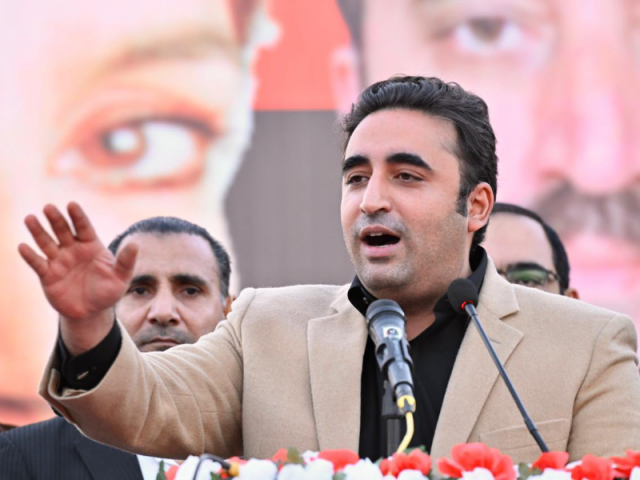Bilawal unveils charter of economy
PPP chairman vows to restructure uplift agenda

Pakistan Peoples Party (PPP) Chairman Bilawal Bhutto Zardari formally launched a ‘Public Charter of Economy’, detailing his 10-point electoral pledge aimed at reviving the ailing economy, containing the unprecedented inflation and ushering the country into an era of growth and development.
Addressing two separate events at the Begum Nusrat Bhutto Auditorium in Larkana district, Bilawal blamed the previous governments of Gen (retd) Pervez Musharraf, Nawaz Sharif and then Imran Khan for the plummeting investment ratio in the country.
“Today 93 million people of Pakistan, which is 40% of our population, live below the poverty line and 50 million people have been added to this list between 2018 and 2023,” the PPP chairman said, adding that the economic crisis had been intensified by the catastrophic climate crisis.
He added that 241 million people in the country would be exposed to perpetual floods and then ultimately perpetual droughts in the years and decades to come even though Pakistan’s carbon footprint is less than 1%. “Pakistan is undeniably a frontline state in the climate crisis,” he warned.
Bilawal argued that consumption-based growth strategy as pursued by former military ruler Pervez Musharraf and then by Imran Khan and Nawaz Sharif resulted in rendering Pakistan’s investment ratio as the worst among other comparable countries.
He underlined that the public investment plummeted from a high of 12% of the Gross Domestic Product (GDP) during the government of former prime minister and PPP founder late Zulfikar Ali Bhutto to only 2% in 2023.
By enhancing investment, Bilawal stated, the government could ensure long-term and sustainable inclusive growth. “The PPP will implement a two-pronged investment plan under which the public-private partnership model of Sindh will be applied across the country,” he continued.
He also promised heavy investments in climate adaptability. “The traditional ways of the PSDP [Public Sector Development Programmes] will be done away with and all the development and investment from the government in infrastructure and other sectors will be seen through the lens of climate.”
Read Bilawal says only an arrow can be used to hunt a lion
The pledgesThe PPP’s chairman said if his party formed the federal government after the February 8 elections, it would increase the minimum wage in real terms by 8% per annum. He added that the public sector and the public-private sector investments would focus on jobs creation.
According to him, under a ‘Green New Deal’ initiative, climate-change-related investments would be made in the public sector through the public-private partnership (PPP) mode, in addition to the foreign direct investment. “We aim to completely restructure Pakistan’s development strategy, development agenda and the PSDP to tackle the climate crisis,” he said.
He believed that access to affordable electricity was a right, which was being denied by the existing system of pricing and distribution. He assured that a PPP government would provide sustainable solutions to the energy crisis by providing electricity through indigenous sources and renewables.
“The green energy parks will be established across Pakistan through the PPP mode. These parks will provide off-grid power and green energy solutions to the local communities,” He stated, adding that the poorest households would be given free electricity up to 300 units through solar-generated power and that the entire process would be funded through the carbon credits.
Bilawal promised that PPP government would ensure quality primary schools within 30 minutes travel time and quality middle and secondary schools within 60 minutes travel time, while the students from the rural areas and low-income urban communities will be given stipends.
“The PPP’s federal government will replicate the health initiatives taken in Sindh to apply to the rest of the country so that the people may avail free healthcare for chronic diseases,” he stated emphasising on his party’s health agenda.
He gave “his word” that the PPP government would construct 3 million houses for the poor people; regularise all katchi abadis [slums] and give ownership rights to women head of the families, residing in the riverbed areas.
“We want to bring them [people of katcha areas] into the mainstream. They should give up weapons and violence and they should peacefully become a part of society.”
He shared that he intended to expand Benazir Income Support Programme (BISP) to provide interest-free microloans to women; education allowance to children in the deserving families; vocational training to youth and health coverage against “catastrophic health expenditures” to poor families.
Under the initiatives for the peasants and labours, the Kissan, Hari and Mazdoor cards would offer direct subsidies to buy agricultural inputs, job security, social protection, pension, disability benefits, old-age benefits, health insurance and school fees. “The farmers will also be helped in the marketing of their produce; against droughts and locust attacks; and in fixing of the support prices through these cards.”
لائیو: بھٹو ہاؤس، نوڈیرو میں کارکنان اور عہدیداران کے اعزاز میں ظہرانہ https://t.co/6eXBBtr9da
— Pakistan Peoples Party - PPP (@PPP_Org) January 16, 2024
He promised reforms in the tenancy and labour laws to boost agricultural investments. “We will bring a revolution for labours by launching the Mazdoor Card in 2024. The youth will get financial assistance for one year after completing graduation during their search for jobs,” he added.
“The government will build youth centres in all districts of the country, while will provide a platform for cultural activities and for dance and music in addition to providing vocational training and career counselling services. They will be equipped with library, digital library, wi-fi and sports facilities.”
Bilawal said taking cue from his grandfather Zulfikar Ali Bhutto, he would secure overseas employment opportunities for youth and for this purpose training and languages skills would also be imparted to youth.
Lastly, elaborating on his tenth pledge pertained to eradicating hunger, the PPP’s chairman said A Right to Food Act will be enacted. The law, he explained, would enable all eligible households to purchase essential food items at subsidised rates.
The government will also launch a nutrition programme for 1,000 days for expecting and new mothers to provide nutritional support to mother and new-born during that period of time, he added.



1733130350-0/Untitled-design-(76)1733130350-0-208x130.webp)















COMMENTS
Comments are moderated and generally will be posted if they are on-topic and not abusive.
For more information, please see our Comments FAQ